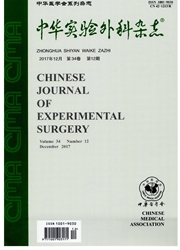

 中文摘要:
中文摘要:
目的观察促炎因子白介素(IL)-6、肿瘤坏死因子(TNF)-α及抗炎因子白介素(IL)-4在退变椎间盘组织内的表达,并探讨其意义。方法收集30例单节段椎间盘突出症患者及10例经前路松解手术的特发性脊柱侧弯患者的髓核组织,术前患者临床症状严重程度均予Oswestry功能障碍指数(0DI)评定,23例行MRI检查的患者,根据Schneiderman分级评定椎间盘退变程度,术后应用酶联免疫吸附测定法(ELISA)测定髓核组织中IL-6、TNF-α和IL-4的含量。结果退变髓核中IL-6的含量(11.2±7.5)ng/L较对照组(6.4±0.8)ng/L高(P〈0.01)、TNF-α的含量(186.8±86.0)ng/L亦较对照组(122.3±23.5)ng/L高(P〈0.05);IL-4的表达仅存在于TNF-α表达较高的髓核组织中;IL-6及TNF-α的同时表达与ODI评分高低正相关(IL-6:B=0.481,β=0.229,P〈0.05;TNF-α;B=6.945E-2,β=0.522,P〈0.01);椎间盘退变MRI分级与促炎因子和抗炎因子的高低无明显相关。结论促炎因子TNF-α与IL-6的表达增高为椎间盘退变的重要原因。亦为临床症状加重的重要原因之一;促炎因子与抗炎因子表达的不平衡亦可能为椎间盘退变进展的重要因素。
 英文摘要:
英文摘要:
Objective To probe the expression of pro-inflammatory cytokines (interleukin-6, tumor necrosis factor-α) and anti-inflammatory cytokine (interleukin-4) in the degenerative discs and its clinical significance. Methods Specimens of nucleus pulposus from 30 cases of disc herniation in single level and 10 cases of scoliosis following anterior release were harvested. The degree of clinical symptoms in all cases was evaluated by Oswestry disability index and the degree of the disc degeneration in MRI was assesed by Schneiderman's classification. The contents of interleukin-6, tumor necrosis factor-α and interleukin-4 were detected by enzyme-linked immunosorbent assay. Results The expression levels of interleukin-6 (11.2 ± 7.5) and tumor necrosis factor-α (186.8 ± 86.0) were significantly higher in the patients than in the controls (6.4 ± 0.8 and 122.3 ± 23.5 respectively). There was a positive correlation between the co-expression of interleukin-6 and tumor necrosis factor-α and ODI evaluation (IL-6: B = 0. 481,13 = 0. 229, P 〈 0.05 ; TNF-α: B = 6. 945 E-2, β = 0. 522, P 〈 0.01 ). Interleukin-4 only existed in the case of high concentration of tumor necrosis factor-α. There was no relationship between the MRI grades and the expression of cytokines. Conclusion The high expression of pro-inflammatory cytokines, such as interleukin-6 and tumor necrosis factor-α, is one of the important reasons for disc degeneration and related to the clinical symptoms. The unbalance between the expression of pro-inflammatory and anti-inflammatory cytokines may be one of the important reasons for disc degenerations.
 同期刊论文项目
同期刊论文项目
 同项目期刊论文
同项目期刊论文
 期刊信息
期刊信息
